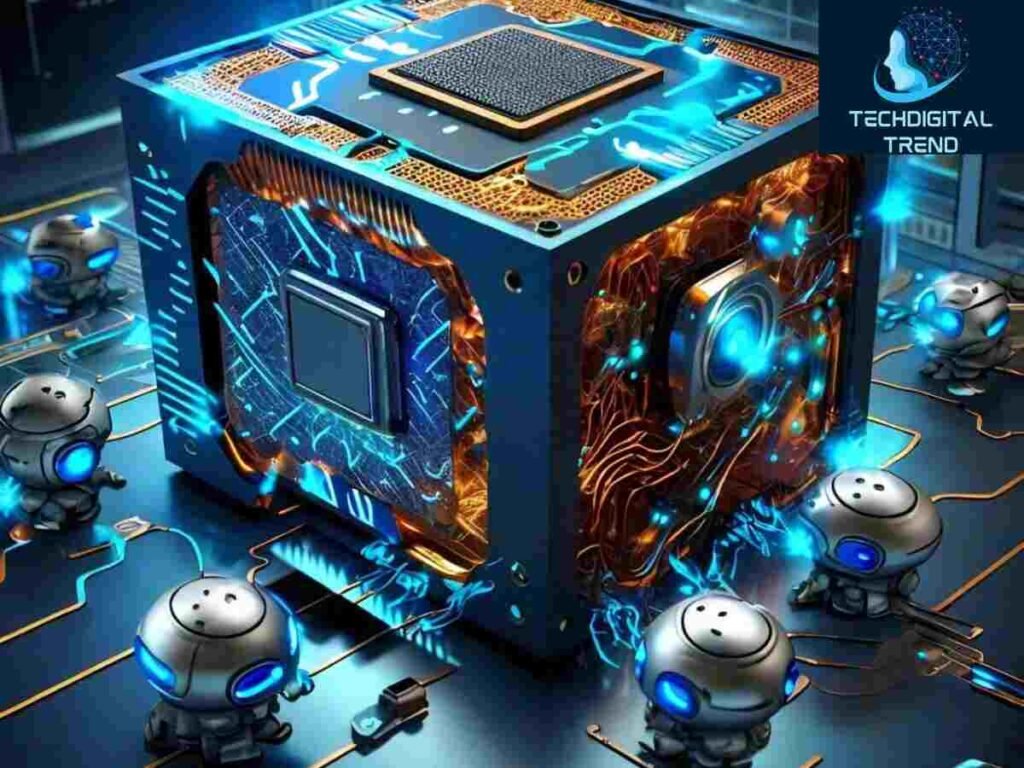Table of Contents
ToggleHardware Innovations
In a world of rapid technological advancements, hardware innovations shape and redefine our daily lives. From sleek smartphones to powerful gaming consoles, the realm of hardware is constantly evolving to meet the demands of modern consumers. In this article, we’ll explore five cutting-edge hardware innovations revolutionizing various industries and changing how we interact with technology.
Quantum Computing: Unleashing Unprecedented Processing Power
The Promise of Quantum Supremacy
By using the ideas of quantum mechanics to carry out intricate calculations at speeds that are unthinkable for classical computers, quantum computing represents a paradigm shift in processing capacity. Leading the way in the development of quantum gear that can solve issues that were previously thought to be insurmountable are businesses like IBM, Google, and D-Wave.
Neuromorphic Chips: Mimicking the Human Brain
Bridging the Gap Between Man and Machine
Inspired by the architecture of the human brain, neuromorphic chips are designed to process information like biological neural networks. These chips excel at tasks such as pattern recognition, making them ideal for applications in artificial intelligence, robotics, and autonomous vehicles.
Flexible Electronics: Redefining Form and Function
Breaking Free from Rigidity
Gone are the days of bulky, rigid electronics. Flexible electronics, made possible by advancements in materials science and engineering, are paving the way for wearable devices, foldable smartphones, and rollable displays. These hardware innovations not only offer greater convenience and portability but also open up new possibilities for product design and user interaction.
Photonic Computing: Harnessing the Power of Light
Light-Based Computing Solutions
Photonic computing harnesses the speed and efficiency of photons to process and transmit data, offering significant advantages over traditional electronic systems. With the ability to transmit data at the speed of light and consume less energy, photonic devices are poised to revolutionize telecommunications, data centers, and high-performance computing.
Biometric Authentication: Enhancing Security and Convenience

Beyond Passwords and PINs
Biometric authentication technologies, such as fingerprint scanners and facial recognition systems, are rapidly becoming ubiquitous in modern devices. By using unique biological traits for identity verification, these systems offer enhanced security and convenience, eliminating the need for cumbersome passwords and PINs.
5G Connectivity: Revolutionizing Our Method of Connecting
Speed, Latency, and Bandwidth
The rollout of 5G networks promises to revolutionize connectivity, offering blazing-fast speeds, ultra-low latency, and increased bandwidth. This next-generation technology will enable seamless communication between devices, unlock new opportunities for hardware innovations, and drive the development of IoT (Internet of Things) ecosystems.
Edge Computing: Bringing Processing Power Closer to the Source
Decentralized Data Processing
To improve efficiency and lower latency, edge computing processes data closer to the point of generation. By distributing computing resources across a network of devices, edge computing enables real-time data analysis and decision-making, making it ideal for applications in autonomous vehicles, smart cities, and industrial automation.
Augmented Reality (AR) Glasses: Bridging the Digital and Physical Worlds
Immersive Experiences and Enhanced Productivity
AR glasses overlay digital information onto the user’s field of view, blending the virtual and physical worlds seamlessly. From immersive gaming experiences to hands-free navigation and remote assistance, AR glasses have the potential to revolutionize how we interact with our environment and access information.
Advanced Battery Technologies: Extending Device Lifespan

Beyond Lithium-Ion
Advancements in battery technology, such as solid-state batteries and lithium-sulfur batteries, promise to deliver longer battery life, faster charging, and increased energy density. These hardware innovations are crucial for powering the next generation of portable electronics, electric vehicles, and renewable energy storage systems.
Holographic Displays: Creating 3D Visualizations
Revolutionary Display Technology
Holographic displays create three-dimensional images that appear to float in space, offering immersive viewing experiences without the need for special glasses or headsets. From entertainment and advertising to medical imaging and design visualization, holographic displays have applications across various industries.
Conclusion
The landscape of hardware innovations is vast and dynamic, with breakthroughs occurring at an astonishing pace. From quantum computing to holographic displays, the ten cutting-edge innovations discussed in this article represent just a glimpse into the future of technology. By embracing these advancements and fostering a culture of innovation, we can unlock new possibilities, improve efficiency, and enhance the quality of life for people around the world.
In a world where technology plays an increasingly integral role in our daily lives, staying informed about the latest hardware innovations is essential. Whether you’re a tech enthusiast, a business leader, or simply a curious individual, keeping up-to-date with emerging trends can help you harness the power of technology to drive positive change and shape the future.
Open this link: Tap to here














